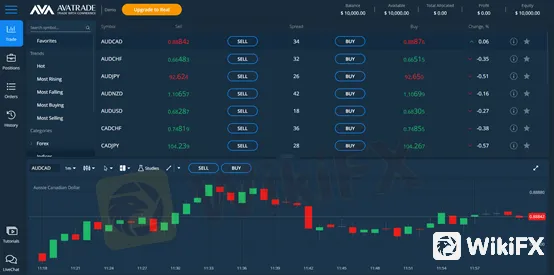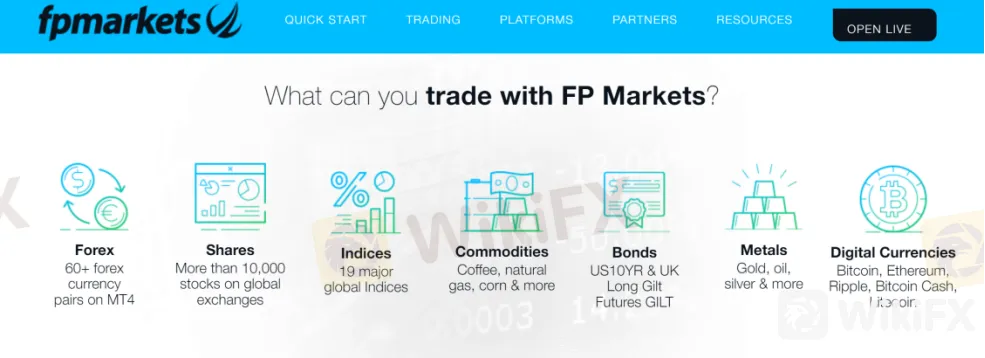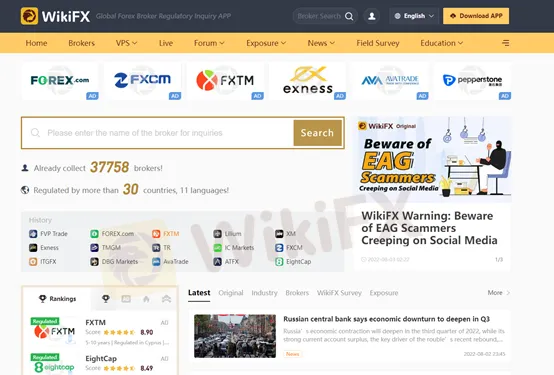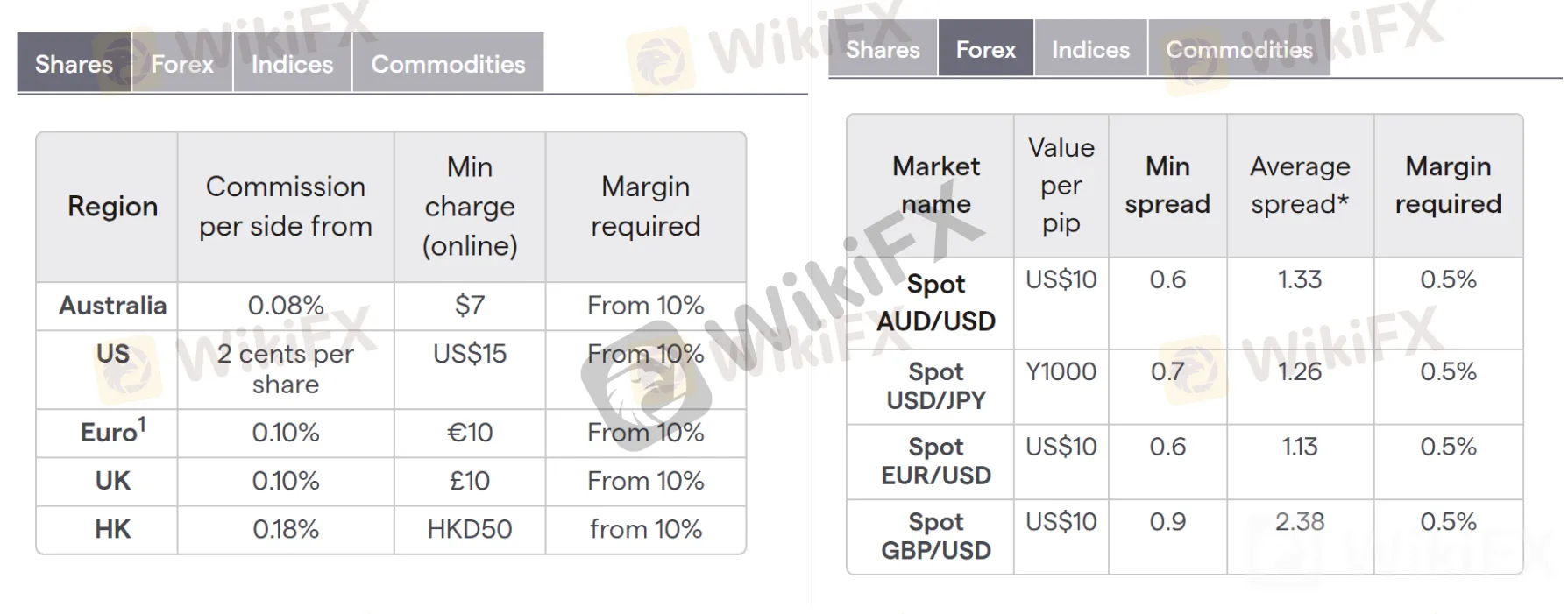User blogs
Metaverse, NFTs, and Crypto tokens
Metaverse - The metaverse is an online, three-dimensional universe that combines multiple virtual spaces. It can be compared to a future version of the internet. With metaverse, users will be able to collaborate, meet, play games, and socialise in these 3D spaces.To get more news about crypto token, you can visit wikifx.com official website.
NFT - NFT stands for Non-Fungible Tokens. NFTs are digital items that can be bought and sold using this blockchain technology. However, they are not fungible, making them a different type of asset, one that is based on value and popularity.
Crypto Tokens - Tokens, unlike crypto coins, lack do not have their own blockchain. They work with cryptocurrency blockchains. Many tokens, for example, run on Ethereum, which also includes stablecoins.We'll look at how the Metaverse, NFT and crypto tokens interact and why celebrities are flocking into the NFT space, which is again related to the Metaverse and cryptocurrencies.
A Metaverse is a virtual representation of reality. Users can use a virtual self – a custom-made avatar that can look any way they want – to attend concerts, visit art galleries, or visit foreign places in these virtual worlds.
There is also more than one Metaverse. And several companies are working on a variety of them, each with its own set of network protocols. These Metaverses all have the same goal in mind: to allow more overlap between our physical and digital lives.

While cryptos are primarily used for handling transactions and other tasks relevant to the physical world, cryptocurrencies are digital assets that are used as a medium of exchange and a store of value in these virtual worlds.
There are also NFTs, which allow for the purchase or sale of one-of-a-kind digital artworks on the blockchain.
Only a few people can boast of owning a Monet when it comes to paintings. Others can certainly make prints of the original, but they aren't worth nearly as much like the original as, unlike the impression, the ownership isn't transferred.
The same principle holds true for NFTs. The ownership of the NFT is established on the blockchain through various network processes, which establishes the actual owner of any piece of art without a doubt.
While all of this may appear completely random, there is a link between these blockchain facts.Users can have complete control over their digital assets in the Metaverse, thanks to NFTs. Blockchain technology provides immutable confirmation of ownership that underpins these virtual worlds.
For instance, if you bought a bunch of LAND in Decentraland, the Metaverse would provide you with proof of confirmation in the form of NFTs, which would be guaranteed by the blockchain.
NFTs are also important in the Metaverse for creating exclusive environments and enhancing the digital community and social experiences.
Premium NFTs are used to gain access to the digital world's wealthiest and most affluent communities, as well as exclusive perks, staking rewards, and other high-end collectibles.
The Bored Ape Yacht Club and CryptoPunks collections, for example, grant select users access to premium communities with password-protected content and even offline parties.
4 Best Cryptocurrency Exchanges In 2023
Bitcoin and other cryptocurrency discussions pop up almost anywhere you go. It's possible that you've heard a little bit about blockchain technology. Over the past several years, there has been a steady rise in interest in cryptocurrencies by individuals, institutions, and even countries. Traders Union analysts compiled a list of the best crypto exchange to consider when choosing the platform to work with.To get more news about WikiBit, you can visit wikifx.com official website.
1. Coinbase
Coinbase, co-founded in 2012 by Fred Ehrsam and Brian Armstrong, is one of the best cryptocurrency exchanges, if not THE finest. Based on the number of transactions, it is one of the most important cryptocurrency exchanges in the United States. Coinbase has repeatedly assured its clients that their digital funds are secure. To the author's knowledge, no hacks have been implemented successfully on this platform. Coinbase's popularity stems in part from the ease with which crypto investors can buy bitcoin using fiat currencies like USD, making Coinbase one of the most widely used crypto exchanges.

2. Binance
Binance, an exchange started by Changpeng Zhao or "CZ," has routinely surpassed other exchanges because of its cheap trading fees. Binance is a reliable exchange for buying cryptocurrencies since it gives its clients several options to manage their funds. Binance provides a number of services, including trading, staking, farming, and cold storage, among others. All of these strategies for passively earning a return on an investment are intriguing. It's worth your time to investigate these opportunities, as the vast majority involve earning money while you sleep.
3. Bybit
Bybit is a forward-thinking cryptocurrency derivatives exchange that was founded in 2018. It is currently experiencing rapid expansion. The company was established by a group of industry experts with prior experience working in investment banking and the foreign exchange market. Bybit is a cryptocurrency company that is based out of Singapore but is officially incorporated in the British Virgin Islands. It proposes the establishment of a worldwide economy and offers a trading system that appears to be swift, secure, and open. It has begun a journey with the goal of creating the financial ecosystem of the next generation, which will be powered by cutting-edge and revolutionary blockchain technology. Bybit continues to prioritize its customers, even with more than 1.6 million active users worldwide, whether they are retail or professional clients and works hard to deliver the greatest possible user experience. You can read more about the Bybit review on the Traders Union website.
4. KuCoin
On the largest cryptocurrency exchange known as KuCoin , users have the ability to buy, sell, and trade digital currencies. In addition to the more traditional trading choices, the platform also enables more complex trading methods, such as margin trading, futures trading, and peer-to-peer trading. Users also have the ability to bet or lend their bitcoin, which can further improve the benefits they receive. In comparison to its rivals, KuCoin's trading fees are significantly lower, making it a very attractive option for clients.
Top Cryptocurrency Events to Watch Out for in 2023
Cryptocurrency and blockchain can be intimidating to research about, but one of the best ways to learn more about crypto, blockchain, DeFi, the metaverse, and all other nascent concepts is by attending cryptocurrency events. Many organizers are now holding more in-person events to allow interested enthusiasts to meet the movers and shakers of the crypto and blockchain industries.To get more news about crypto events, you can visit wikifx.com official website.
To help you discover what notable crypto events to watch out for this year, we've curated a list of some of the top crypto, blockchain, NFT, and metaverse events that are worth attending.
Why Go to Crypto-Related Events?
Whether you're a crypto expert or an enthusiast, crypto events serve as a way for you to expand your personal network and establish partnerships with other like-minded individuals. You'll be thrust into a professional network where you have the opportunity to meet, learn from, and even collaborate with major industry players, developers, designers, investors, and pioneers in crypto or blockchain.

Aside from gaining industry insights, you'll be able to gain a wider perspective on these emerging technologies. You'll get to join in on debates, panels, and live discussions that are all event exclusive. If you'd like a change of scenery, some of these major crypto events are held in some of the most picturesque locations like Valencia, Davos, and Šibenik.
Moreover, you'll have the opportunity to discover new products or technology from participating vendors. Who knows-you might just find the solution that can help move your business forward in one of these cryptocurrency events. Plus, aside from learning about new products or new tech, you may also be able to strike a partnership with one of the vendors.
If you're already an expert in cryptocurrency or in the blockchain space, you may want to consider signing up as a guest speaker. Aside from being able to establish yourself as an expert, you'll be able to tap into a network of other leaders in the crypto landscape.
The World Crypto Conference (WCC) 2023 will bring together some of the world's leaders in DeFi, Metaverse, and traditional finance. WCC aims to connect key players in these industries from developers and investors to blockchain companies and traditional corporate entities. You'll find debates, panels, workshops, and discussions on topics such as the role of digital assets in the context of traditional finance, with the key topics being NFT, the Metaverse, and DeFi.
Dubbed as "the most influential Blockchain event in Europe", the European Blockchain Convention 2023 will feature over 200 speakers who will discuss topics such as blockchain, crypto, NFTs, DeFi, and Web 3. It will host over 100 sessions in three stages to help guests learn more about the latest updates and innovations in the blockchain, crypto, and Web 3 spaces.
The three-day event will welcome more than 3,000 attendees in a gigantic 2,000-sqm exhibition area. Aside from panels, keynotes, workshops, and networking parties, guests can expect to witness over 500 1:1 meetings, as well as get the chance to meet some of the leading blockchain startups in Europe.
The Blockchain Event in Fort Lauderdale aims to educate guests about how blockchain can help businesses across industries like finance, healthcare, and entertainment. There will be panel discussions, presentations of case studies, and keynote speeches on topic like the use cases of blockchain, how to develop and launch blockchain projects, and how blockchain investments and implementations are benefitting businesses.
Get ready for the 6th edition of the UK's leading blockchain event. This two-day event will bring together over 2,000 attendees and more than 120 journalists from over 65 countries. Here, you'll get the chance to meet and learn from some of the world's top blockchain entrepreneurs and crypto companies. Some of the speakers for the 2023 Blockchain Economy London Summit include:
Known as the world's "longest running ETH event", the ETHDenver hosts "#BUIDLathons", workshops, community gatherings, and innovation festivals. It's also home to the world's "largest Web3 #BUIDLathon". It will invite blockchain companies from all over the world to host events. Expect to see a lot of cool features during the ETHDenver 2023, such as an art gallery and makerspace, #BUIDL floors, a Zen Zone, and livestream presentations. Plus, what sets this event apart from other crypto events is that it offers free childcare. The #BUIDL Week will run from February 24 to March 1, while the ETHDenver event will run from March 2 to March 5, 2023.
Crypto Traders Worried About Liquidity Thinning in Bitcoin and Ether
Liquidity conditions in the bitcoin (BTC) and ether (ETH) markets continue to worsen, and the situation is now more alarming than it was three months ago. That has traders worried about abrupt price swings in the crypto market.To get more news about crypto currency liquidity, you can visit wikifx.com official website.
Liquidity refers to the ability of the market to absorb large buy and sell orders at stable prices. The commonly used metric for assessing liquidity conditions is 2% of market depth - a collection of buy and sell offers within 2% of the mid-price or the average of the bid and the ask/offer prices.Data from Paris-based crypto data provider Kaiko show bitcoin's 2% market depth for USDT pairs aggregated from 15 centralized exchanges has slipped to 6,800 BTC, the lowest since May 2022 when the Terra network collapsed and below the level that followed the demise of crypto exchange FTX. It's down significantly from the October highs of above 15,000 BTC. Ether's 2% market depth has more than halved to 57,000 ETH since October, led by Binance.
"Thin liquidity means more drastic moves, particularly in alternative cryptocurrencies," Matthew Dibb, chief investment officer at Astronaut Capital, said.
"Funds trying to trade size are forced to TWAP over longer periods (days or weeks) hence why it looks like some charts have recently been 'walked up' such as STX," Dibb added.
TWAP, or time-weighted average price, is an algorithmic strategy focused on achieving an average trade execution price close to the time-weighted average price of the asset. In other words, it involves breaking a large order into smaller quantities and executing those at regular intervals to minimize the impact on the going market and reduce slippage.
Slippage is the difference between the expected price at which a trade is placed and the actual price at which the buy/sell transaction is executed. Slippage usually occurs when there is low market liquidity or high volatility."Realistically, though, dwindling market depth has also meant that most large funds have not been participating at the same level as previous due to the amount of slippage associated," Dibb noted, adding that any large institution that offloads coins now is going to have a deeper effect on the market.

The latest decline in the market depth comes amid dwindling volatility expectations in the bitcoin market. This kind of situation often leads to sudden explosion in volatility, according to Griffin Ardern, a trader from crypto asset-management firm Blofin.
The Bitcoin Volatility Index (BVIN), which measures the implied or expected volatility over the next 30 days, has declined to 56.39, its lowest level since at least early 2021, according to data source CryptoCompare.
Bitcoin's seven-day variance risk premium, or the difference between the seven-day implied volatility and seven-day realized volatility, has flipped negative, according to data tracked by Amberdata. It shows short-term volatility expectations are underpriced.
"An environment conducive to high volatility is being created," Ardern said. "And because the depth is low, it only takes a small amount [buy/sell order] to influence the price, and the resulting hedging activity of market makers to amplify market volatility through hedging."
Market makers always take the opposite side of investors' trades and maintain a market-neutral portfolio by buying and selling the underlying asset as the price swings. Their hedging activity is known to influence the bitcoin's spot market price and could have an outsized impact this time, thanks to low market depth.The crypto market liquidity began drying up in mid-November after Alameda Research and FTX went bust. Alameda was one of the most prominent market makers, providing billions of dollars in liquidity to small- and large-cap tokens. The resulting contagion brought down several trading desks, including Arbitrage and high-frequency trading firms, and hurt prominent market makers like Genesis, which is owned by CoinDesk's parent company, Digital Currency Group.
WikiBit's Panel of Experts are Bullish on Hong Kong as a New Crypto Hub
Victoria, Re Wan Chai, Hong Kong S.A.R.- On March 10th, WikiBit, the global blockchain exchange regulatory inquiry platform, organized a roundtable discussion to explore the factors driving the rise of Hong Kong as a major hub for cryptocurrency activities. The event brought together experts and thought leaders from the industry to share their insights on this growing trend.To get more news about WikiBit App, you can visit wikifx.com official website.
During the panel discussion, participants analyzed the regulatory framework, market trends, and business opportunities that have contributed to Hong Kong's emergence as a new center for crypto-related activities. The experts also discussed the challenges and potential risks associated with this trend and shared their perspectives on the future of cryptocurrencies in the region.

The roundtable discussion provided a platform for a comprehensive and informative dialogue on the dynamics shaping the crypto landscape in Hong Kong. WikiBit remains committed to providing valuable insights and resources to promote greater understanding and awareness of the blockchain industry worldwide.
Hong Kong's bid to become a digital asset hub is drawing in cryptocurrency companies seeking to capitalize on mainland China's appetite for trading in tokens. With its new regulatory regime for exchanges and plans to legalize crypto trading for retail investors, Hong Kong is increasingly being seen as a more crypto-friendly destination than Singapore, which implemented a crackdown on the sector last year.
As the world's fourth-largest crypto market, despite the Chinese government's ban on the sector in 2021, mainland China continues to present a significant demand for digital coin trading. As a result, companies are rushing to establish a presence in Hong Kong in the hopes of capturing this demand.
The move to Hong Kong comes as a response to the potential opportunities presented by the city's push to become a crypto hub, with companies looking to gain a foothold in the region's growing market. These developments signal a shift in the dynamics of the cryptocurrency industry in the region, as businesses seek to navigate evolving regulatory frameworks and seize new business opportunities.
As companies continue to flock to Hong Kong, they will face challenges and risks associated with the nascent industry, including regulatory uncertainties, cybersecurity threats, and market volatility. However, with Hong Kong's growing reputation as a crypto-friendly destination, coupled with the increasing demand from mainland China for digital assets, the prospects for the cryptocurrency industry in the region appear bright.
A robust regulatory framework not only safeguards the interests of investors but also instills greater confidence in builders and investors alike. In this regard, Hong Kong, the emerging cryptocurrency hub, has been at the forefront of setting new regulatory standards in the industry. With Asia's second-largest economy, Hong Kong has taken proactive steps to safeguard investors while also promoting the growth of the crypto industry.
The city has been exploring ways to enhance its regulatory framework to ensure that it aligns with global standards and provides a safe and secure environment for cryptocurrency-related activities. The regulatory regime for exchanges and the recent legalization of crypto trading for retail investors are just some of the steps taken to encourage the growth of the crypto industry in the city.
The measures adopted by Hong Kong demonstrate the government's commitment to promoting innovation while also ensuring that investors are adequately protected. As a result, Hong Kong has become an attractive destination for businesses looking to establish a presence in the region's growing cryptocurrency market.
The establishment of a strong regulatory framework is a positive development for the industry as it provides a sense of stability and predictability that investors and builders need to operate effectively. As Hong Kong continues to lead the way in this regard, other jurisdictions in the region and beyond may look to follow suit, creating a more consistent and transparent regulatory environment for the cryptocurrency industry globally.
Blockchain success starts here
Blockchain defined: Blockchain is a shared, immutable ledger that facilitates the process of recording transactions and tracking assets in a business network. An asset can be tangible (a house, car, cash, land) or intangible (intellectual property, patents, copyrights, branding). Virtually anything of value can be tracked and traded on a blockchain network, reducing risk and cutting costs for all involved.To get more news about blockchain knowledge, you can visit wikifx.com official website.

Why blockchain is important: Business runs on information. The faster it's received and the more accurate it is, the better. Blockchain is ideal for delivering that information because it provides immediate, shared and completely transparent information stored on an immutable ledger that can be accessed only by permissioned network members. A blockchain network can track orders, payments, accounts, production and much more. And because members share a single view of the truth, you can see all details of a transaction end to end, giving you greater confidence, as well as new efficiencies and opportunities.
A private blockchain network, similar to a public blockchain network, is a decentralized peer-to-peer network. However, one organization governs the network, controlling who is allowed to participate, execute a consensus protocol and maintain the shared ledger. Depending on the use case, this can significantly boost trust and confidence between participants. A private blockchain can be run behind a corporate firewall and even be hosted on premises.
Permissioned blockchain networks
Businesses who set up a private blockchain will generally set up a permissioned blockchain network. It is important to note that public blockchain networks can also be permissioned. This places restrictions on who is allowed to participate in the network and in what transactions. Participants need to obtain an invitation or permission to join.
Consortium blockchains
Multiple organizations can share the responsibilities of maintaining a blockchain. These pre-selected organizations determine who may submit transactions or access the data. A consortium blockchain is ideal for business when all participants need to be permissioned and have a shared responsibility for the blockchain.
A simple step by step guide on how to use the WikiBit app
WikiBit is a third-party service platform that allows you to check the formality, authenticity, and compliance of specific blockchain trading platforms. It offers several types of services to help you get all the information you need on a particular blockchain trading platform. This information enables you to make an informed decision and steer clear of inauthentic trading platforms. You can gain access to all this information through the official WikiBit website or the WikiBit App. In this excerpt, we will be looking at a guide for using the WikiBit app.To get more news about WikiBit App, you can visit wikifx.com official website.
How to use the WikiBit App
Using the app is not challenging. This means that it does not need any technical know-how. Below is a guide on how to use the WikiBit App;

Step 1: Download the app
The first step is to download the WikiBit app. Doing this is effortless because you can download the app from various platforms. Currently, it is available in the App Store, Google Play Store, and the Android download platform. This also means that you can use the app on various devices like Android and Apple smartphones. The only limit is that you cannot use it on your computer. All you must do is visit any of the platforms mentioned above, search for the WikiBit app, and then click download.
Step 2: Log in or create an account
The next step, after downloading the app, is logging in. The process starts by clicking the login icon. Doing this will open a page where you will be asked to enter some information. The first step will require you to choose your location then enter your mobile phone number.
The aim of providing your phone number is to get a verification code. You must enter the verification code to proceed to the next step. You can also choose to log in through your Facebook account. The platform also allows you to log in with ID or the QR code provided at the top of the page.
Step 3: Start using
After filling in all the mandatory data and logged onto the platform, you can now start using the platform. Using the app is quite simple. The app grants you access to a search tool. Using the tool, you can type in the title or name of any bitcoin trading platform and click search. Doing this will provide you with a wide range of information like the licenses, regulation details, risk exposure, and platform data. You will also get a page with all recent news on the platform.
How Zero-Knowledge Proofs are Revolutionizing Blockchain Technology
Blockchain technology has the potential to revolutionize industries beyond finance, and it is often associated with popular cryptocurrencies like Bitcoin. It operates as a decentralized and distributed ledger, enabling secure, transparent, and immutable record-keeping. However, traditional blockchains face significant challenges related to privacy and scalability.To get more news about blockchain knowledge, you can visit wikifx.com official website.
Privacy concerns arise due to the transparent nature of blockchain transactions, while scalability issues stem from the increasing size and complexity of the blockchain. To address these challenges, Zero Knowledge Proofs (ZKPs) offer a promising solution. ZKPs allow for verifiable transactions without revealing sensitive information, and in this blog, we will delve into how ZKPs can reshape the blockchain landscape by addressing privacy and scalability concerns in traditional blockchain networks.
What are Zero Knowledge Proofs (ZKPs)?
Zero Knowledge Proofs (ZKPs) are cryptographic protocols that allow one party, known as the prover, to prove to another party, known as the verifier, that a specific statement is true without revealing any additional information about the statement. In the context of blockchain technology, ZKPs are significant as they offer solutions to the challenges of privacy and scalability.

ZK-rollups are a type of Layer 2 scaling solution that uses Zero Knowledge Proofs (ZKPs) to provide scalability and privacy benefits to blockchain transactions. ZKPs allow the prover to prove the validity of a statement without revealing any additional information, while ZK-rollups use this technology to bundle multiple transactions off-chain and verify them on-chain as a single transaction. This approach greatly reduces the computational cost and transaction fees associated with blockchain transactions while maintaining the integrity and security of the underlying blockchain network. In summary, ZK-rollups are a practical application of ZKPs that can significantly enhance the scalability and privacy of blockchain transactions.
Properties of ZKPs
• Completeness: Zero-Knowledge Proofs (ZKPs) ensure that a valid statement can be proven to be true to the verifier. The prover can provide convincing proof that the statement is true, and the verifier can verify the proof's validity.
• Soundness: ZKPs provide soundness, ensuring that an invalid statement cannot be proven to be true by the prover. If the statement is false, the prover will not be able to generate valid proof, and the verifier will not be convinced of its truth.
• Zero-Knowledge: ZKPs allow for proof without revealing any additional information about the statement or the proof itself. The prover can prove the statement's truth without disclosing any knowledge or details about how the proof was generated, ensuring privacy and security in the process.
Types of ZKPs
1. Interactive Zero-Knowledge Proofs (iZKPs) is a type of proof in which the prover and verifier engage in a back-and-forth process to prove a statement. The verifier sends random challenges to the prover, who must respond with proof that satisfies the verifier's challenges. The Schnorr protocol, the Fiat-Shamir heuristic, and the Guillou-Quisquater protocol are examples of iZKPs.
2. Non-Interactive Zero-Knowledge Proofs (NIZKPs) is another type of proof that the prover generates without interaction with the verifier. The proof is then sent to the verifier for verification. NIZKPs are more efficient and faster than iZKPs as they do not require any interaction between the prover and verifier. zk-SNARKs, Bulletproofs, and STARKs are examples of NIZKPs.
What is cryptocurrency and how does it work?
Cryptocurrency, sometimes called crypto-currency or crypto, is any form of currency that exists digitally or virtually and uses cryptography to secure transactions. Cryptocurrencies don't have a central issuing or regulating authority, instead using a decentralized system to record transactions and issue new units.To get more news about Crypto currency market, you can visit wikifx.com official website.
What is cryptocurrency?
Cryptocurrency is a digital payment system that doesn't rely on banks to verify transactions. It's a peer-to-peer system that can enable anyone anywhere to send and receive payments. Instead of being physical money carried around and exchanged in the real world, cryptocurrency payments exist purely as digital entries to an online database describing specific transactions. When you transfer cryptocurrency funds, the transactions are recorded in a public ledger. Cryptocurrency is stored in digital wallets.

Cryptocurrency received its name because it uses encryption to verify transactions. This means advanced coding is involved in storing and transmitting cryptocurrency data between wallets and to public ledgers. The aim of encryption is to provide security and safety.
The first cryptocurrency was Bitcoin, which was founded in 2009 and remains the best known today. Much of the interest in cryptocurrencies is to trade for profit, with speculators at times driving prices skyward.
How does cryptocurrency work?
Cryptocurrencies run on a distributed public ledger called blockchain, a record of all transactions updated and held by currency holders.
Units of cryptocurrency are created through a process called mining, which involves using computer power to solve complicated mathematical problems that generate coins. Users can also buy the currencies from brokers, then store and spend them using cryptographic wallets.
If you own cryptocurrency, you don't own anything tangible. What you own is a key that allows you to move a record or a unit of measure from one person to another without a trusted third party.
Although Bitcoin has been around since 2009, cryptocurrencies and applications of blockchain technology are still emerging in financial terms, and more uses are expected in the future. Transactions including bonds, stocks, and other financial assets could eventually be traded using the technology.
Cryptocurrency examples
There are thousands of cryptocurrencies. Some of the best known include:
Bitcoin:
Founded in 2009, Bitcoin was the first cryptocurrency and is still the most commonly traded. The currency was developed by Satoshi Nakamoto - widely believed to be a pseudonym for an individual or group of people whose precise identity remains unknown.
Ethereum:
Developed in 2015, Ethereum is a blockchain platform with its own cryptocurrency, called Ether (ETH) or Ethereum. It is the most popular cryptocurrency after Bitcoin.
Litecoin:
This currency is most similar to bitcoin but has moved more quickly to develop new innovations, including faster payments and processes to allow more transactions.
Ripple:
Ripple is a distributed ledger system that was founded in 2012. Ripple can be used to track different kinds of transactions, not just cryptocurrency. The company behind it has worked with various banks and financial institutions.
Non-Bitcoin cryptocurrencies are collectively known as "altcoins" to distinguish them from the original.
Best cryptocurrency exchanges and trading apps in April 2023
While cryptocurrency has surged in popularity in recent years, only a minority of Americans have actually traded it. Among the most popular cryptos are Bitcoin, Ethereum and Cardano, each of which has seen a lot of action as prices rise and fall. The appeal for traders? The potential to make significant money on the volatility of these highly speculative assets.To get more news about best crypto exchange, you can visit wikifx.com official website.
Increasingly, traders have more and more ways to access cryptocurrencies. New exchanges and trading platforms have started in response to the wide interest in crypto. In fact, you may already have an app on your phone that lets you trade. For example, if you have the PayPal or Venmo apps, you can buy and sell at least a few different cryptocurrency coins. But other apps and exchanges give you access to a wider selection of cryptocurrency - there are literally thousands - or they offer other benefits such as lower cost.
The platforms below include specialized crypto exchanges, online brokers, and cash and payment apps. We've included pricing as well as how many coins you're able to trade, so you can get a sense of the scope of each app or exchange.

If you're interested in trading the largest cryptocurrency, Bitcoin, exclusively, it may not make sense to go with an app that offers you dozens of other coins. On the other hand, if you're looking to trade whatever is hot at the moment, consider an app or exchange with more variety.
Bittrex
Bittrex is an attractive option for crypto traders thanks to its straightforward low-cost commissions, particularly for those trading high volumes. If you're trading less than $50,000 every 30 days, you'll pay between 0.25 and 0.30 percent in commissions, but the fees fall quickly from there if you're trading big bucks. Plus, Bittrex doesn't charge for USD deposits or ACH withdrawals.
Hard-core crypto enthusiasts will also appreciate Bittrex's offering of about 100 cryptocurrencies to trade. You'll find all the most popular coins including Bitcoin, Ethereum and Dogecoin, as well as the more obscure listings.
Binance.US, which is the American arm of the larger Binance organization, is one of the best crypto exchanges because of its low trading costs. Bitcoin and Ethereum traders can access commission-free trades, while other coins are priced on a sliding scale for high-volume traders. Plus, if you use Binance's in-house coin, BNB, to pay trading fees, you'll get a discount of 25 percent.
The broker eToro is all crypto, all the time (at least for American traders, though others can trade stocks). At eToro, you'll have access to about 80 cryptocurrencies, including quite a few, such as Tezos, Uniswap and Polygon, that you won't normally find on the traditional brokerage apps. The app doesn't charge a direct commission but rather a flat spread markup of 1 percent, regardless of which coin you purchase or how much.
Coinbase
Coinbase is a specialized cryptocurrency exchange that allows you to trade a bunch of digital currencies, 230 at the latest count. That range will likely scratch your crypto itch, since it includes most of the top coins, including Bitcoin, of course. But what will you pay for using the basic service? Unfortunately, Coinbase has become cagier about what you'll pay to trade, recently obscuring the fee structure on its website.
When it was visible, the fee structure was complex, to say the least. You'd pay a spread markup of about 0.5 percent and a transaction fee that depended on the size of the transaction and the funding source. For Coinbase Advanced Trade, you'll pay fees that start at 0.6 percent for 30-day volume under $10,000 and decline to as low as 0.15 percent for up to $100,000 in volume and then head even lower.
Kraken
Kraken is another specialized cryptocurrency exchange that lets you trade a ton of different coins, including the most popular as well as some (Solana, Uniswap, Cardano and more) that are not typically available on the usual financial apps. In total, the exchange supports trading in more than 212 cryptos. Kraken does not offer its service to residents of New York and Washington state.
Commissions on Kraken Pro are competitive, ranging from 0.16 to 0.26 percent at the lowest volume levels and declining to a range of 0 to 0.1 percent with volume of $10 million or more in the last 30 days. High-net-worth traders can also access margin trading, increasing their buying power (and risk). While you can deposit money via ACH for free into Kraken, debit or credit card transactions incur a 3.75 percent fee plus 25 cents, and you can get hit with a 0.5 percent online banking processing fee if you fund through a bank, at last check.